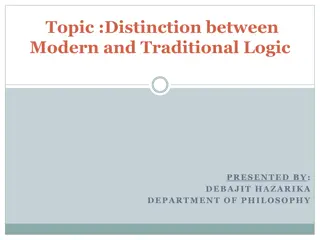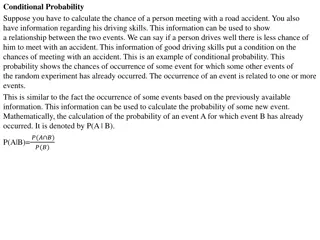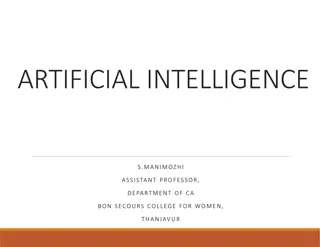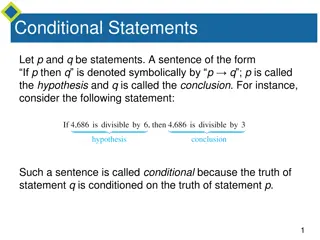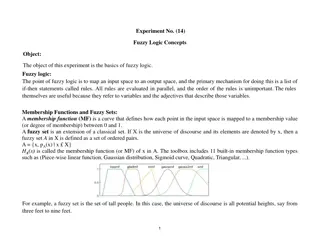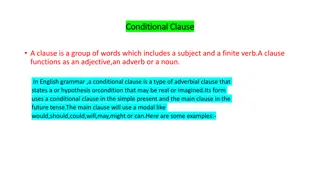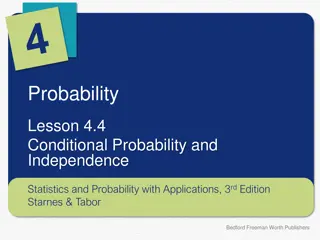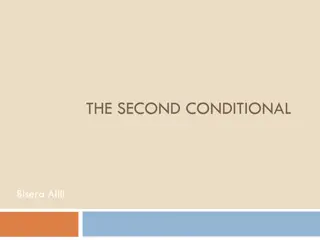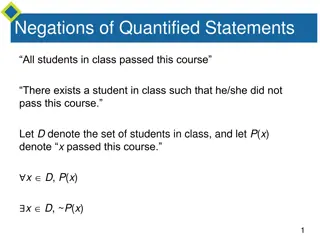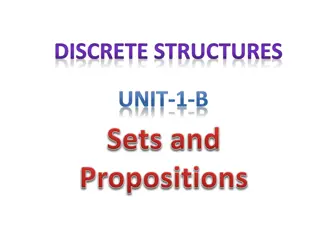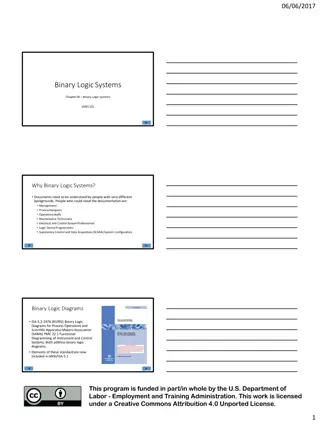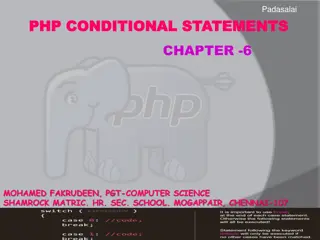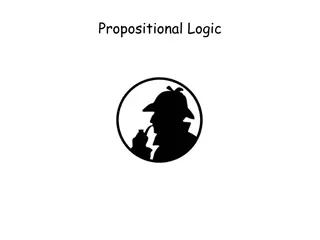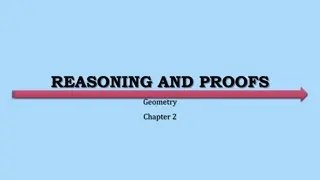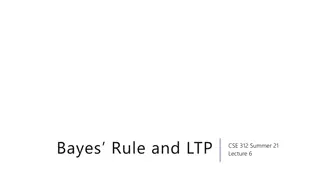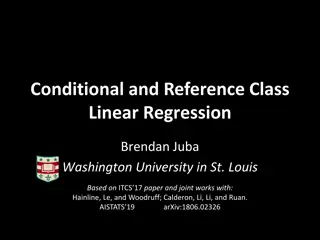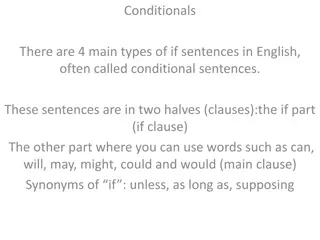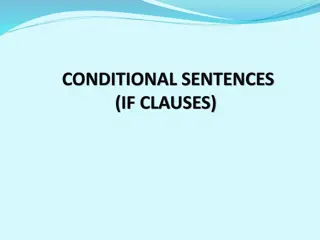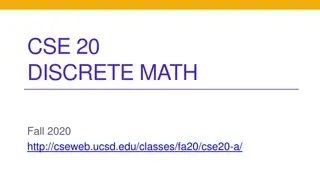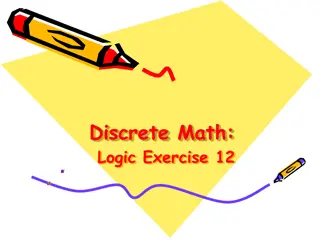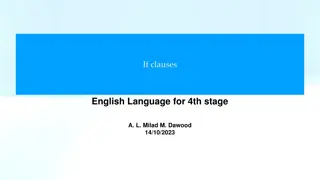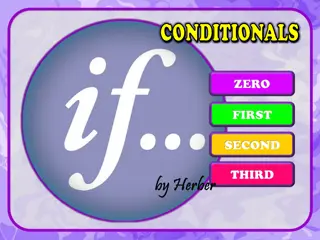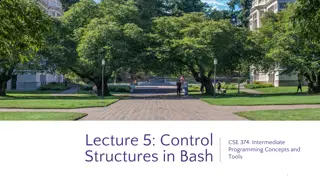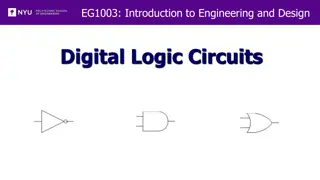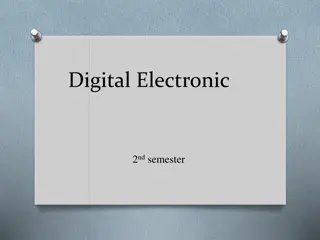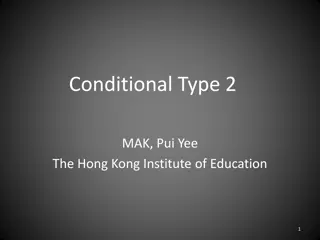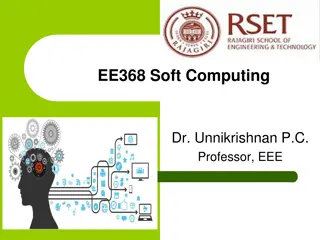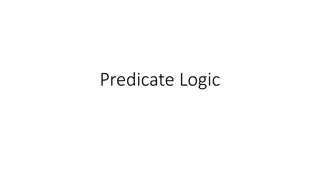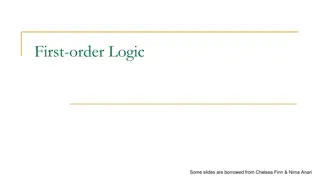Understanding Logical Form and Equivalence in Conditional Statements
Delve into the intricacies of logical form, equivalence, and compound statements in the realm of propositional logic. Explore valid and invalid arguments, conditional statements, and the logic of compound statements with puzzles to sharpen your logical reasoning skills. Unravel scenarios like determ
2 views • 81 slides
Topic : Distinction between Modern and Traditional Logic.
Logic, as a normative study, focuses on distinguishing correct reasoning from incorrect. Traditional logic, based on Aristotle's work, emphasized syllogistic reasoning, while modern logic, pioneered by figures like Leibnitz and Russell, employs mathematical methods and symbolic logic for a more adva
2 views • 10 slides
Understanding Conditional Probability and Bayes Theorem
Conditional probability relates the likelihood of an event to the occurrence of another event. Theorems such as the Multiplication Theorem and Bayes Theorem provide a framework to calculate probabilities based on prior information. Conditional probability is used to analyze scenarios like the relati
1 views • 5 slides
Logic Families
Logic families such as Diode Logic (DL), Resistor-Transistor Logic (RTL), and Diode-Transistor Logic (DTL) each have distinct capabilities and limitations when it comes to performing logic functions. While DL gates are simple and inexpensive but limited in functionality, RTL gates offer both normal
1 views • 22 slides
Understanding Predicate Logic in Artificial Intelligence
In the world of artificial intelligence, predicate logic plays a crucial role in representing simple facts. It involves syntax, semantics, and inference procedures to determine the truth value of statements. Real-world facts are represented using propositions in logic, allowing for structured knowle
1 views • 19 slides
Understanding Conditional Statements in Logic
Conditional statements in logic involve connecting statements with an "if-then" structure. The truth of the conclusion is dependent on the truth of the hypothesis. Explore examples, truth tables, and logical equivalences to grasp the concepts of conditional statements.
0 views • 26 slides
Understanding Fuzzy Logic Basics
Fuzzy logic is a powerful concept that involves mapping inputs to outputs using rules, membership functions, and fuzzy sets. Logical operations like AND, OR, and NOT play a key role, along with if-then rules in formulating conditional statements. The fuzzy inference process includes fuzzification, a
0 views • 9 slides
Understanding Conditional Clauses in English Grammar
A conditional clause is a type of adverbial clause in English grammar that states a hypothesis or condition using a conditional clause in the simple present and the main clause in the future tense. This type of clause uses modal verbs like would, should, could, will, may, might, or can. Conditional
2 views • 6 slides
Understanding Logic Circuits in Aircraft Systems
Aircraft logic systems follow MIL/ANSI standard logic symbols and conventions used in electronic applications. Inverters, buffers, AND gates, OR gates, NAND gates, NOR gates, Exclusive-OR gates, and Exclusive-NOR gates are commonly used in aircraft logic circuits. These gates have specific behaviors
0 views • 52 slides
Understanding Conditional Probability and Independence in Statistics
Conditional probability and independence are essential concepts in statistics. This lesson covers how to find and interpret conditional probabilities using two-way tables, calculate probabilities using the conditional probability formula, and determine the independence of events. Through examples li
0 views • 15 slides
Understanding Conditionals and Biconditionals in Logic
Conditional statements, also known as if-then statements, play a crucial role in logic. They consist of a hypothesis (following "if") and a conclusion (following "then"). By identifying the hypothesis and conclusion, writing conditional statements, evaluating truth values, and exploring converses, o
0 views • 19 slides
Understanding the Second Conditional in English Grammar
The second conditional in English grammar is used to talk about unlikely or impossible situations in the present or future. It involves using 'if' followed by the past simple, 'would', and the infinitive. This type of conditional is different from the first conditional as it deals with less likely s
0 views • 10 slides
Understanding Negations in Quantified and Conditional Statements
Explore the concept of negations in quantified statements, where the negation of a universal statement equates to an existential statement, and vice versa. Discover the importance of negations in universal conditional statements and their relationship to logical equivalence. Dive into examples of ne
0 views • 15 slides
Exploring Unusual Activities and Second Conditional Grammar
Delve into the realm of unusual activities and learn about the second conditional grammar in this engaging study. Discover vocabulary related to hypnotism, hair dyeing, and tarantulas. Explore how the second conditional is used to discuss improbable future scenarios and present impossibilities. Unde
1 views • 9 slides
Understanding Propositional Logic and Mathematical Logic in Computer Science
Study the development of formal logic in computer science, focusing on propositional logic and mathematical logic. Learn about propositions, logical operators, and ways of combining statements to derive conclusions. Explore examples and understand how to determine the validity of arguments using log
0 views • 38 slides
Understanding Binary Logic Systems in Documentation
Binary logic systems play a crucial role in documentation for individuals with diverse backgrounds such as management, process designers, operations staff, maintenance technicians, and more. These systems, depicted in binary logic diagrams, provide a clear and concise representation for various prof
4 views • 16 slides
Understanding PHP Conditional Statements for Decision Making Logics
Conditional statements in PHP are essential for decision-making logics, allowing the execution of specific code blocks based on defined conditions. This article covers different types of conditional statements like if, if-else, if-elseif-else, and switch in PHP, along with syntax examples and their
0 views • 17 slides
Understanding Propositional Logic Concepts
Explore different facets of propositional logic, including conditional statements, logic operators, logical equivalence, contrapositives, and proofs. Delve into the intricacies of if-then statements, logical negations, and the nuances of if, only-if conditions. Enhance your understanding of proposit
0 views • 25 slides
Understanding Conditional Statements in Geometry
In this chapter of "Big Ideas Geometry," the focus is on conditional statements in geometry. Learn how to write conditional and biconditional statements, determine if statements are true or false, and explore logical implications such as converse and negation. Through examples and explanations, gras
0 views • 54 slides
Introduction to Symbolic Logic: Understanding Logical Inferences
Logic is the study of reasoning methods to distinguish between correct and incorrect arguments. Symbolic Logic involves representing logic symbolically for easier understanding and manipulation. Logical inferences help in making decisions based on reasoning chains. The content discusses the use of l
1 views • 28 slides
Understanding Bayes Rule and Conditional Probability
Dive into the concept of Bayes Rule and conditional probability through a practical example involving Wonka Bars and a precise scale. Explore how conditional probabilities play a crucial role in determining the likelihood of certain events. Gain insights on reversing conditioning and applying Bayes
0 views • 35 slides
Conditional and Reference Class Linear Regression: A Comprehensive Overview
In this comprehensive presentation, the concept of conditional and reference class linear regression is explored in depth, elucidating key aspects such as determining relevant data for inference, solving for k-DNF conditions on Boolean and real attributes, and developing algorithms for conditional l
0 views • 33 slides
UBU Performance Oversight Engagement Framework Overview
Providing an overview of the UBU Logic Model within the UBU Performance Oversight Engagement Framework, this session covers topics such as what a logic model is, best practice principles, getting started, components of the logic model, evidence & monitoring components, and next steps. The framework
0 views • 33 slides
Understanding IF Conditionals in English Grammar
IF conditionals in English grammar introduce different kinds of conditions that may or may not happen, including the zero conditional, first conditional, second conditional, and third conditional. These conditionals are expressed through IF clauses followed by main clauses, each serving a specific p
0 views • 16 slides
Understanding the 4 Main Types of Conditional Sentences in English
Conditional sentences in English consist of two parts: the "if" clause and the main clause. There are four main types of conditional sentences - Zero Conditional, First Conditional, Second Conditional, and Third Conditional. Each type is used to express different conditions and outcomes based on cer
1 views • 16 slides
Understanding Conditional Sentences and Time Clauses
Conditional sentences are divided into real and unreal scenarios. Real conditionals, like zero and first conditionals, express present or future possibilities, while unreal conditionals, such as second and third conditionals, discuss imaginary or impossible situations. The use of "if" indicates less
0 views • 32 slides
English Grammar Practice: Conditional Sentences Type 3
Practice English grammar with a focus on conditional sentences type 3. The content includes examples and exercises to help improve understanding and usage of past perfect tense, conditionals, and past participle forms. Explore scenarios and complete sentences to enhance your skills in forming comple
0 views • 14 slides
Understanding Conditional Sentences (If Clauses) in English Grammar
This content provides insights into conditional sentences (if clauses) in English grammar, focusing on the First Conditional for talking about possible future events or situations. It explains the structure, usage, and examples of First Conditional sentences in different contexts such as predictions
0 views • 7 slides
Discrete Mathematics Learning Goals and Examples in Propositional Logic
Explore the learning goals in discrete mathematics focusing on translating English sentences to propositional logic, evaluating compound propositions, forming converses and contrapositives, and determining consistency. Dive into examples of conditional statements, converse, inverse, contrapositive,
0 views • 14 slides
Conditional Statements in Discrete Math: Logic Exercise Solutions
Practice writing conditional statements in English for various scenarios such as weather conditions, achievements, requirements, and guarantees. Understand the antecedent and consequent relationship in logic exercises. Common ways to express conditional statements explained with examples.
0 views • 5 slides
Understanding If Clauses in English Grammar
If clauses are a vital aspect of English grammar, serving to express conditions that must be met for specific outcomes. They come in four types, including the zero conditional for facts, the second conditional for unlikely situations, and the third conditional for past hypothetical scenarios. While
0 views • 28 slides
English Conditional Sentences Practice Examples with Images
Explore a collection of English conditional sentences practice examples with accompanying images. From zero conditional to third conditional, learn how to construct sentences using different tenses and structures. Enhance your understanding of if-clauses and main clauses through these visual aids.
0 views • 21 slides
Bash Control Structures Overview: Functions, Variables, Boolean Logic, and If Statements
This lecture covers essential topics in Bash scripting, including control structures such as functions, variable scope, boolean logic, and if statements. Understand how to declare functions, manage variable scope, use boolean operators for logic operations, and create conditional if statements for d
0 views • 11 slides
Understanding Digital Logic Circuits and Design Principles
Explore the world of digital logic circuits with a focus on logic gates, truth tables, boolean equations, and Karnaugh maps. Learn how to design combinational logic circuits, analyze different logic functions, and solve sample problems related to digital logic. Get hands-on experience with LabVIEW a
0 views • 28 slides
Introduction to Digital Electronic Circuits and Logic Gates
Understanding digital electronic circuits and logic gates is essential for building digital systems. This content covers the basics of logic gates, digital signals, and the practical application of binary digits in circuits. It discusses the function and importance of logic gates, such as NOT gates
0 views • 17 slides
Conditional Type 2 - If I Had a Million Dollars Revision
Learn about the second conditional type and practice forming conditional sentences using "If I had a million dollars" scenario. Understand the usage of the 1st conditional for discussing possible future situations and explore the consequences of hypothetical scenarios like having a bird on your head
0 views • 22 slides
Introduction to Logical Thinking: Science of Correct Reasoning
Logic, the science of correct reasoning, explores ways to infer conclusions from assumptions and validate arguments. This course introduces logic as a tool for analyzing arguments, automating processes, and enhancing communication clarity. Through classic logic variants like propositional and predic
0 views • 30 slides
Applications of Fuzzy Logic in Soft Computing
Fuzzy logic is primarily used as the underlying logic system for decision support systems in various applications. From fuzzy controllers to fuzzy rule bases, this technology enables approximate reasoning similar to human decision-making processes. Explore the architecture and major components of Fu
0 views • 27 slides
Understanding Predicate Logic and Quantifiers
Predicate logic extends propositional logic by allowing statements to be assigned specific values. The limitations of propositional logic are overcome through predicate logic, where statements like "?. is greater than 3" have subject and predicate parts denoted as ?(?). Furthermore, predicates can b
1 views • 20 slides
Understanding First-Order Logic Fundamentals
Explore the limitations of propositional logic and delve into the syntax, semantics, and inference rules of first-order logic. Learn about predicates, quantification, and how to express relationships among objects using predicates. Enhance your understanding of how first-order logic provides a more
0 views • 42 slides

